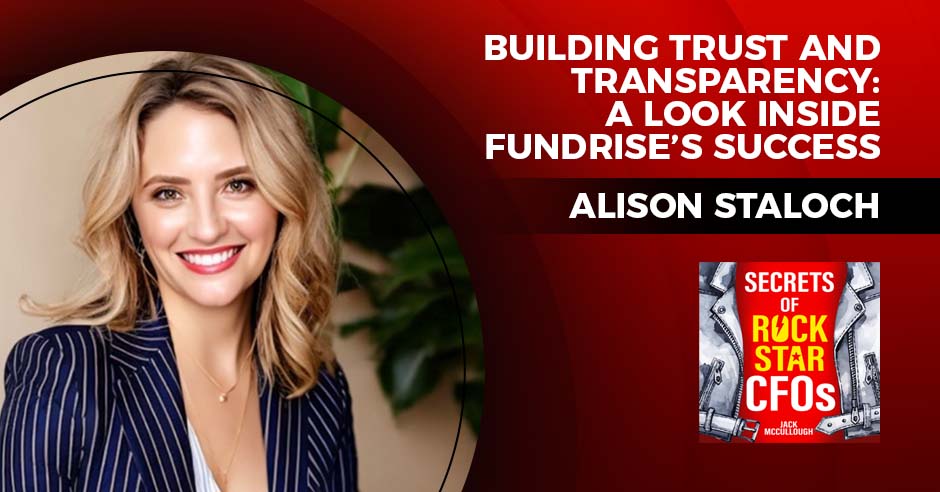Fraser Armstrong Watters has been CFO of The Palisades Group, an Austin, Texas-based alternative asset manager in the global residential credit market, since August 2020. Remembering his first months there, he talked with StrategicCFO360 about the initial steps a new CFO should take, what moves have an immediate impact on the business and the book he keeps referring back to.
How can a CFO create an immediate impact upon joining a company?
While the CFO is traditionally thought of as being the analytical side of their companies, one of the biggest assets a CFO or any executive can have is being adaptable. It’s common for us to join a company with a preexisting idea of what our role or impact will be, but the biggest impact can be made by addressing what the company actually needs.
The first hurdle to get over is having an open and honest relationship with all the stakeholders of the company: the CEO, executive team, direct reports, department leaders, the board, investors, auditors and bankers. These conversations will reveal what the finance and accounting team is doing well, what could be better and how F&A can be helpful going forward.
You’ll also find that these conversations help to weed through the “fog of war” that is joining a new company, by giving a clear view of the short, medium and long-term actions necessary to have an immediate impact.
Some examples of the types of actions you may find necessary include developing a comprehensive plan to optimize cash flow, implementing cost control measures, elevating the company’s analysis capabilities, or establishing a risk management framework. Each of these could assist in establishing a role as CFO and create an immediate impact.
How can a CFO build strong relationships and collaboration within the company upon joining?
When joining a new company, the biggest obstacle can often be finding your own footing. Making sure you have an accurate understanding of the company and its business is imperative to the success of the CFO.
I look at building relationships with existing stakeholders at the company as a shortcut to understanding it. Engaging in conversations with the CEO, executives, department heads and vendors like those for audit, tax and banking will provide a much clearer picture of the internal business operation.
To build those relationships quickly, I’d recommend entering those conversations with humility, an assumption that the individual is competent and the belief that they have the business’ best interest at heart. Then I’d leverage the opportunity to see what the F&A teams have been doing well and what can be improved.
The answers you’ll get from department heads will be far different from your vendors, but they’ll give you a full picture of what’s necessary to make an impact at your company.
What approach can a CFO take to improve financial processes and systems upon joining a company?
Core to the role of a CFO is establishing robust systems for controls, business forecasting and accounting. Especially as we become more tech-leaning, there’s an increasing amount of pressure to continually improve and refine these systems. I believe the solution reflects the problem.
As we’re constantly exposed to new technologies and capabilities, it becomes incumbent on CFOs to be continually learning and implementing as well. The “quick fix” of today could easily become dated within a few months from now. Instead, adopting a mindset of incremental improvement and regularly reviewing existing systems has proved to yield consistent results, in my experience.
I’d also recommend empowering yourself by being open to continuous learning, and fostering an environment where your colleagues feel comfortable to collaborate and make suggestions for improvement. I’ve personally benefited from these tactics as well as the book, The Power of Habit by James Clear. It’s a book that I still refer back to.
How can a CFO influence the company’s long-term financial health upon joining?
To think about a company’s long-term financial health, I consider how the F&A team would operate if I had to take an extended leave. A company’s biggest strength will always be its employees. Fostering the development of the talent at your company is essential to maintaining its financial health.
That goes hand-in-hand with ensuring that they’re using effective tools to serve the organization. It’s imperative that the systems relied on by the organization are iterative so they can easily be used by other members of the F&A team. These systems should also provide data-driven insights, allowing us to identify strengths, weaknesses and areas of improvement, thus steering the company toward a financially healthier future.
Outside of talent and technology, I’d also recommend focusing on capital management and capital structure. Effective working capital management is vital for a company’s financial health. I’d prioritize optimizing cash—including money market funds, accounts receivables and payables, ensuring that cash flow remains steady and sufficient to support operations and future growth.
Capital structure relies on establishing and nurturing relationships in the capital markets to ensure you can access debt and equity as required. I prefer to raise money when you can, and not when you need it. When thinking about a company’s long-term financial health it’s important to be proactive about situations that may arise whether or not you expect them to.








